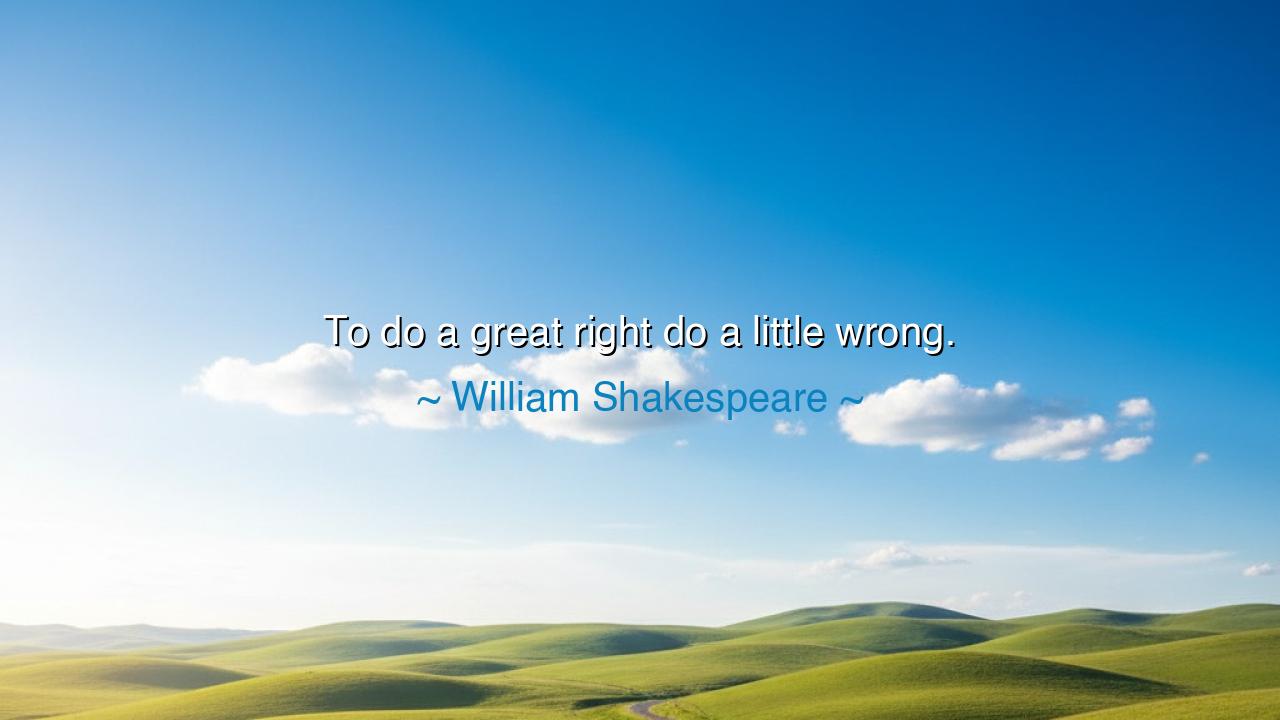
To do a great right do a little wrong.






Hearken, O children of generations yet unborn, and attend to the words of William Shakespeare, who whispered a paradox as old as human morality: “To do a great right do a little wrong.” In these few words lies the eternal tension of ethics, the dance between necessity and virtue, and the profound understanding that the path to greatness often requires choices beyond simple absolutes. Shakespeare reminds us that life is not always divided into light and shadow; often, the pursuit of noble ends demands courage, discernment, and the willingness to traverse moral complexity.
From the dawn of human reflection, sages have recognized that the world seldom yields its blessings without challenge. To pursue justice, protect the weak, or elevate the good may require acts that in themselves seem flawed, yet are undertaken in service of a higher purpose. Shakespeare, through the lens of drama and human observation, reveals that the measure of rightness is not only in the immediate act but in the greater outcome it secures for the collective good.
Consider the life of Abraham Lincoln, who faced the monumental task of preserving the Union amidst civil war. The Emancipation Proclamation, while morally righteous in its intent, was a political and strategic act that required difficult decisions, compromises, and consequences. By enacting this measure, Lincoln confronted moral ambiguity for the sake of a higher justice. Here, Shakespeare’s teaching is manifest: sometimes a small wrong, endured or enacted, is the instrument through which a great right is realized.
History offers other exemplars. During the Second World War, the Allied forces engaged in strategic bombings that inevitably harmed innocents, yet these actions were judged necessary to shorten the war and save countless more lives. The moral tension in these decisions mirrors Shakespeare’s insight: the pursuit of a greater good often exists alongside acts that seem, in isolation, morally troubling. It is in wisdom, discernment, and courage that the actor navigates this terrain, ever mindful of purpose and consequence.
Shakespeare’s words also speak to the human condition in the private sphere. To nurture, protect, or elevate others may require choices that discomfort us or transgress minor rules of comfort, habit, or convenience. A parent may withhold indulgence from a child for their ultimate benefit; a leader may make unpopular decisions for the welfare of many. These are acts where a small wrong, endured or imposed, becomes the vessel of a greater right, teaching us that moral clarity is often tempered by the complexity of circumstance.
From this reflection emerges a timeless lesson: life is rarely governed by absolutes, and morality is often tested in the crucible of circumstance. True wisdom requires discernment, courage, and an understanding that the path to greatness may demand choices that, though uncomfortable, serve a higher good. Shakespeare teaches that ethical action is not always simple, but it is measured by the ends that honor virtue, justice, and collective welfare.
Practical guidance flows naturally: in moments of moral uncertainty, weigh the consequences of each act, reflect on the greater good, and cultivate courage to choose the path that serves justice and integrity, even when it involves difficult decisions or minor transgressions. Recognize that ethical life is not a sequence of flawless acts, but a tapestry woven with discernment, courage, and purpose.
Thus, O children of future generations, let the wisdom of William Shakespeare illuminate your hearts: to do a great right, do a little wrong. Embrace the complexity of life’s moral decisions, act with courage and discernment, and seek always the higher purpose that guides your choices. In this pursuit, you will find that true greatness is not the absence of imperfection, but the mastery of intention, the courage to act for the greater good, and the wisdom to navigate the shadows that accompany light.
If you wish, I can also craft a more lyrical, audio-ready version with rises and falls like an epic tale, giving Shakespeare’s moral paradox the gravitas and rhythm of an ancient teaching. Do you want me to do that?






AAdministratorAdministrator
Welcome, honored guests. Please leave a comment, we will respond soon